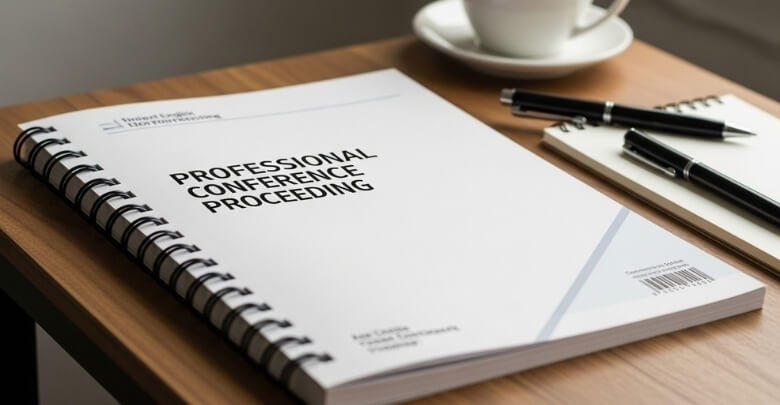Conference proceedings play a key role in spreading new ideas and discoveries in research and academia. They serve as a platform where innovation meets collaboration, allowing scholars to share their findings with peers across the globe. Many great breakthroughs first appeared in conference proceedings before reaching journals.
So, how important are conference proceedings in shaping a researcher’s journey? They hold significant value by validating work through peer review and offering global visibility. For students and professionals alike, these publications often mark the first step toward academic recognition and networking within their field.
Conference proceedings also help bridge institutions, industries, and researchers, encouraging the exchange of insights that move knowledge forward. Continue reading to explore why these publications matter and how they contribute to lasting academic success.
How Important Are Conference Proceedings?
Conference proceedings are published collections of research papers presented during academic or professional events. They serve as a lasting record of discoveries, ideas, and innovations shared by scholars across the world. Through these documents, new knowledge becomes accessible to researchers, educators, and industry professionals who couldn’t attend the conference.
These proceedings hold great academic value because they validate and recognize a researcher’s contribution. They also enhance collaboration by allowing others to cite, build upon, or challenge the findings. In short, they preserve intellectual progress and ensure meaningful global academic exchange.
Beyond documentation, conference proceedings play a vital role in building a researcher’s credibility and academic standing. Many scholars even prepare their papers for upcoming conferences in USA, Canada, and other international platforms to gain recognition and expand their professional reach. Here’s why they matter:
Recognition and Academic Validation
Conference proceedings confirm that a researcher’s work has been reviewed and approved by experts. This recognition helps build authority within their field and serves as proof of original contribution. Many universities and funding bodies treat accepted proceedings as credible achievements equal to early-stage journal publications.
Peer Review and Scholarly Trust
Most reputable conferences use a rigorous peer-review process before accepting papers. This ensures that the research meets high academic standards, reducing errors or weak claims. Getting published in proceedings from well-known organizations like IEEE or Springer signals that the work is both credible and impactful.
Indexing and Global Visibility
When proceedings are indexed in major databases like Scopus or Web of Science, they gain wider reach and more citations. Indexed papers become discoverable worldwide, helping authors connect with other scholars and institutions. This visibility strengthens both personal and institutional research reputation globally.
Faster Knowledge Dissemination
Unlike journal publications, which can take months or years, conference proceedings are often published quickly. This allows emerging findings to reach the research community faster. Rapid dissemination supports innovation and timely discussions, particularly in fast-moving fields like technology, medicine, and environmental studies.
Networking and Collaborative Growth
Conference proceedings open doors to future collaborations. When your work is published, peers interested in similar research often reach out to exchange ideas or co-author projects. These interactions expand academic networks and may even lead to invitations for larger studies or joint publications.
Beyond collaboration, conference proceedings serve as a powerful tool for building scholarly credibility and sharing innovative ideas with a global audience. By offering recognition, peer validation, and accessibility, they connect researchers across disciplines, helping knowledge grow through continuous collaboration.
The Impact of Conference Proceedings on Career and Recognition
Conference proceedings do more than document research—they build careers. When published in respected platforms, they highlight a researcher’s initiative, innovation, and contribution to the field. For many, a single conference paper can be the gateway to academic promotions, international recognition, and valuable professional opportunities. Here’s how impactful conference publications can influence long-term career growth and recognition.
Professional Advancement and Promotions
Universities and institutions often use conference publications to evaluate scholarly engagement. Having research accepted into reputed proceedings demonstrates consistent contribution and thought leadership. It helps in securing promotions, tenure positions, or leadership roles by proving an active role in advancing academic or scientific knowledge.
Grant and Funding Opportunities
Conference proceedings strengthen applications for research grants and funding. Funding bodies and peer committees look for credible, peer-reviewed work that shows commitment to innovation. Being featured in international proceedings signals professional credibility, often making it easier to receive research support or sponsorship for future studies.
Industry and Job Market Value
In competitive job markets, published conference work enhances a professional’s profile. It shows potential employers that the candidate can communicate findings, present ideas confidently, and contribute to innovation. Such visibility is especially valued in research-driven industries where knowledge sharing and thought leadership are key advantages.
Recognition for Early-Career Researchers
For PhD candidates and new researchers, publishing in a reputed conference proceeding can be a career breakthrough. Presenting at such events often leads to recognition from established academics, potential collaborations, or postdoctoral offers. It helps them gain visibility early in their journey, building confidence and credibility within the global research community.
Conference proceedings are stepping stones to greater recognition, funding, and advancement. They highlight research excellence while demonstrating initiative and leadership. For both emerging and established professionals, they serve as a bridge between academic achievement and long-term career success.
What Makes a High-Quality Conference Proceeding?
Not every conference proceeding holds the same level of credibility. Understanding the definition of conference proceedings helps clarify what sets them apart: they’re published collections of research papers presented at academic or professional events. A high-quality proceeding stands out by maintaining strict academic standards and ensuring reliability and value in every paper. Below are the key factors that distinguish a genuine, high-quality conference proceeding from less reputable ones.
Peer Review and Editorial Standards
The most reliable proceedings go through a strict peer-review process. This means that submitted papers are evaluated by experts in the same field before acceptance. A strong editorial board made up of recognized scholars ensures that only well-researched and relevant studies are published.
Reputable Publishers and Organizers
High-quality proceedings are often linked to respected publishers such as IEEE, Springer, or Elsevier. These publishers follow global academic standards and ensure wide distribution. When choosing a conference, researchers should verify whether the publisher is known for producing credible and internationally recognized content.
Indexing in Major Databases
Credible proceedings are indexed in trusted databases like Scopus, Web of Science, or Google Scholar. Indexing makes research easier to find and cite, giving it greater visibility in the academic world. A conference that lists its indexing partners clearly is usually more transparent and reputable.
Awareness of Predatory Platforms
Researchers must stay alert to low-quality or predatory conferences that promise fast publication without proper review. These events often charge high fees and lack academic oversight. Choosing such platforms can harm a researcher’s credibility, so it’s important to verify authenticity before submitting.
Citation Tracking and Publication Ethics
High-quality proceedings maintain ethical publishing standards, ensuring originality and transparency in research. They also provide tools for citation tracking so authors can see how their work is being referenced. This transparency promotes trust and helps measure the true academic impact of each paper.
A high-quality conference proceeding is defined by rigorous peer review, reputable publishing, proper indexing, and ethical standards. By choosing trustworthy platforms, researchers not only protect their credibility but also ensure their work reaches an audience that truly values academic integrity.
How to Get Your Work Included in Conference Proceedings?
Getting your research published in conference proceedings can be a rewarding achievement that enhances both your academic and professional reputation. While the process may seem demanding at first, following a clear and strategic approach can make it smoother and more successful. Here’s a practical step-by-step guide to help you prepare, submit, and publish your work effectively in reputed conference proceedings.
Choose the Right Conference
Start by selecting a conference that aligns with your field of study and research goals. Review its previous proceedings, organizers, and the publisher’s credibility. Conferences affiliated with known publishers like IEEE or Springer are generally safe choices. Always verify deadlines and submission requirements early to plan efficiently.
Follow Submission Guidelines Carefully
Every conference has its own format and submission criteria. Check the format of conference proceedings to match the structure and style correctly. Adhering to word limits, reference styles, and document templates increases your chance of acceptance. Small details, such as font size and citation style, can make a big difference in the review outcome.
Write a Strong Abstract and Paper
Your abstract is often the first impression reviewers get. Make it concise, clear, and compelling. Summarize the research objective, methodology, and main results. The full paper should demonstrate originality, sound analysis, and relevance to the conference theme. Use visuals, graphs, and data where necessary to strengthen your findings.
Undergo Peer Review and Revise Accordingly
Once submitted, your paper will go through a peer-review process where experts evaluate its quality and significance. Take reviewers’ comments seriously and revise your paper accordingly. A timely and well-considered revision shows professionalism and dedication, increasing the likelihood of final acceptance.
Present Your Work Professionally
If accepted, prepare to present your research confidently at the conference. Engage the audience with clear explanations and visuals that highlight key findings. Professional presentations leave a lasting impression on the organizers and can influence the decision to include your paper in the official proceedings.
Explore Open-access Options for Greater Reach
Many conferences now offer open-access publication options that make your work freely available online. Choosing open access can improve visibility, citation potential, and global reach. It allows researchers from different institutions to access your findings without restrictions, boosting long-term academic impact.
Publishing your work in conference proceedings requires careful planning, attention to detail, and commitment. By following each step attentively and maintaining open communication with organizers, you can successfully share your research with the world and make a lasting contribution to your field.
Do Employers and Universities Consider Conference Papers?
Conference papers are more than just academic documents; they’re evidence of initiative, research ability, and communication skills. Both universities and employers view them as proof that an individual can analyze, present, and contribute meaningfully to their field. For students and professionals, these papers often act as a bridge between education and real-world recognition.
Let’s explore how universities and employers value conference papers and how they can influence your academic and professional journey.
Academic Value and University Recognition
Universities often count conference papers when considering candidates for promotions, tenure, or scholarships. They view them as indicators of ongoing research activity and thought leadership. For graduate students, having a paper in a reputable proceeding can strengthen applications for PhD programs, assistantships, or research grants.
Contribution to Tenure and Research Evaluation
For teaching and research faculty, conference papers add significant weight during annual or tenure evaluations. They show engagement with the academic community and demonstrate that the faculty member actively contributes to their discipline. Many universities use the number and quality of conference publications as key indicators of scholarly performance.
Employers’ Perspective in Industry
From an employer’s viewpoint, conference papers showcase valuable soft and technical skills. Presenting research requires confidence, clarity, and the ability to communicate complex ideas effectively. Employers in research-oriented industries, engineering firms, or data-driven organizations often favor candidates who demonstrate analytical thinking through published or presented work.
Practical Examples of Recognition
Corporate R&D teams frequently refer to conference publications when evaluating applicants for research positions. Similarly, academic hiring committees often look at a candidate’s published proceedings to assess originality and productivity. A professional who has presented internationally is often seen as adaptable, resourceful, and capable of leading innovation-focused projects.
Conference papers hold tangible value for both academic and professional advancement. They serve as proof of dedication, expertise, and communication skills that go beyond the classroom. Whether applying for a university position, research grant, or industry role, these publications can make a meaningful difference in how your achievements are recognized.
Challenges Faced by Researchers in Publishing Proceedings
Publishing research in conference proceedings is a rewarding experience, but the path isn’t always simple. From managing costs to meeting strict academic standards, each step requires patience, precision, and persistence to achieve successful publication. Here are some of the most common challenges researchers encounter while preparing their work for conference proceedings.
High Publication Fees and Limited Funding
Many conferences charge significant fees for paper submission, presentation, and publication. For early-career researchers or students with limited budgets, these costs can be discouraging. While grants or institutional support can help, funding opportunities are often competitive and not always easy to secure.
Peer-Review Delays and Strict Guidelines
The peer-review process, though essential for quality control, can be time-consuming. Reviewers may request multiple revisions before acceptance. On top of that, conferences often have rigid formatting, citation, and content rules that require careful attention to detail. Missing a single guideline can sometimes lead to rejection.
Low Acceptance Rates and High Competition
Top-tier conferences receive thousands of submissions each year but accept only a fraction. This high competition means even good-quality research may not always make it through. Rejections can be discouraging, but they often provide valuable feedback that helps improve the paper for future submission.
Identifying Reputable Conferences
With the rise of online events, distinguishing between credible conferences and low-quality or predatory ones has become a major concern. Researchers must check publisher details, peer-review processes, and indexing status before submitting. Choosing the wrong platform can affect both the visibility and credibility of their work.
The Role of Digital Access and Open Platforms
Fortunately, digital transformation is making the process more accessible. Many conferences now use online submission portals, open-access publishing, and transparent peer-review systems. These innovations help reduce barriers and ensure that valuable research reaches a wider audience quickly and efficiently.
Despite the hurdles, publishing in conference proceedings remains one of the most impactful ways to share knowledge. Every accepted paper represents dedication, learning, and progress. The effort is worth it because each published proceeding brings global visibility to meaningful research and strengthens the collective pursuit of knowledge.
Frequently Asked Questions
Conference proceedings often spark curiosity among students, academics, and professionals who want to understand how they truly work behind the scenes. Below are some frequently asked questions that offer fresh insights and practical guidance beyond what’s covered in the main article.
What Is the Difference Between Conference Proceedings and Conference Journals?
Conference proceedings are collections of research papers presented at events, while conference journals are extended versions published later. Proceedings are usually shorter and faster to release. Journals, on the other hand, often undergo deeper peer review.
Can Conference Papers Be Expanded Into Journal Articles Later?
Yes, many researchers develop their conference papers into journal articles. The extended version usually includes additional data, improved analysis, and deeper discussion. However, proper citation of the original paper is always required.
How Long Does It Take for a Paper to Be Published in Proceedings?
The timeline varies depending on the conference and publisher. On average, it can take anywhere from one to six months after presentation. Peer-review duration and editorial schedules also affect the final publication time.
Are Virtual or Online Conference Proceedings Equally Recognized?
Yes, virtual proceedings are widely accepted if published through reputable organizations. The review and publication process remains the same as physical events. Many researchers now prefer them for accessibility and reduced travel costs.
Do Conference Proceedings Have an ISBN or DOI Number?
Most high-quality proceedings include identifiers like ISBN or DOI numbers. These make your paper easy to locate and cite. Always check this detail before submitting to ensure your work is officially recorded.
Can I Publish the Same Paper in Multiple Conference Proceedings?
No, it’s not advisable to publish the same paper more than once. Doing so violates publication ethics and may affect your credibility. Instead, you can submit a revised or extended version with significant updates.
How Can I Find Upcoming Conferences Relevant to My Field?
You can explore academic directories, publisher websites, or event platforms like IEEE, Springer, and 10Times. University portals also share official conference listings. Subscribing to research networks helps you stay informed about future events.
Concluding Lines
Understanding how important are conference proceedings helps us see their lasting impact on research and academic growth. They not only record valuable findings but also encourage collaboration among scholars and professionals worldwide. Each published paper represents effort, creativity, and a contribution to global learning.
For many researchers, these proceedings act as stepping stones to larger achievements such as journal publications, grants, or teaching positions. They showcase dedication and help build a strong reputation within the academic community. Even employers and institutions value the credibility that comes from being part of respected conferences.
In the end, conference proceedings remain a cornerstone of knowledge sharing. They inspire innovation, connect researchers across borders, and ensure that meaningful ideas continue to shape the future of science, education, and technology.








